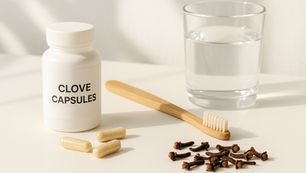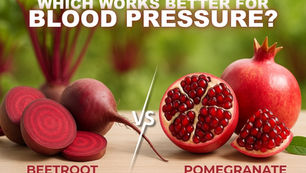top of page
Insights from Nature


Green Tea Detox for the New Year: Your Fresh Start Power Boost
One of the simplest and most effective allies for a New Year detox is green tea. Green tea is rich in antioxidants, particularly catechins such as EGCG (epigallocatechin gallate), which help neutralize harmful free radicals and support the body’s natural detoxification processes. In addition, green tea can gently boost metabolism and enhance mental alertness, making it an ideal choice for a fresh start to the year.


Clove Capsules for Oral and Dental Support: What the Evidence Says
Clove has long been valued across traditional medicine for its remarkable oral and dental applications. Today, modern consumers increasingly turn to clove capsules for dental health because they offer consistent dosing, convenient delivery, and standardized potency. Whether the goal is maintaining gum comfort, supporting natural microbial balance, or complementing daily oral hygiene, clove supplement for oral care provide an accessible way to harness the properties of clove w


Are Clove Capsules Safe? A Research-Based Look at Dosage, Limits, and Overuse
Clove capsules have become a widely used natural option for supporting digestion, immunity, and antioxidant balance. As interest in herbal supplements continues to grow globally, questions about clove capsules safety, safe daily limits, and potential side effects have become increasingly important. Many users want to understand how much is safe, how clove supplement dosage limits are determined, and what risks may appear with overuse. This guide provides a research-grounded e


Understanding Eugenol: The Key Active Compound Inside Clove Capsules
Eugenol is the primary bioactive constituent responsible for most of the wellness properties associated with clove. When people choose clove capsules, clove extract eugenol is the component that drives antioxidant activity, digestive comfort, oral support, and natural microbial balance. Understanding how eugenol works, how the body absorbs it, and how an eugenol supplement differs from whole clove powder helps users make informed choices about their wellness routines.


Peppermint & Cranberry: Wellness Wonders for Digestion and Immunity
Maintaining digestive comfort and urinary health is key to feeling your best every day. Two natural ingredients—peppermint and cranberry—stand out as versatile wellness allies. Peppermint is renowned for supporting digestive ease and soothing discomfort, while cranberry is celebrated for promoting urinary tract health. Together, they offer a natural, evidence-based approach to everyday wellness.


Garlic and Hibiscus: Heart Health Heroes of the Herbal World
Maintaining a healthy heart is one of the most important aspects of overall wellness. Two natural ingredients that have been extensively studied for cardiovascular support are garlic and hibiscus. Together, they provide complementary benefits that help regulate blood pressure, improve circulation, and protect the heart from oxidative stress.


Clove Buds 101: Spice Your Way to Healthier Days with Science-Backed Insights
Clove, rich in eugenol, supports digestion, oral health, immunity, and antioxidant defense—backed by global research. This 3,000-word evidence-based guide explores its origins, mechanisms, and comparisons to cinnamon and ginger. Discover why this ancient spice remains a cornerstone of wellness. [Read more]


Beetroot and Turmeric for Inflammation and Circulation
A natural way to address both is by combining two powerful botanicals — Beet Root and Turmeric. Beet Root enhances nitric oxide production, improving blood flow and oxygen transport. Turmeric, rich in curcumin, provides potent anti-inflammatory and antioxidant protection. Together, this Beet–Turmeric blend supports vascular flexibility, joint comfort, and overall metabolic balance — a true partnership between detoxification and repair.


Beet Root and Grape Seed for Vascular and Antioxidant Support
Two botanicals stand out for their complementary actions in vascular support — Beet Root and Grape Seed extract. While Beet Root enhances nitric oxide production for better circulation and oxygenation, Grape Seed provides powerful antioxidants that protect blood vessels and support elasticity. Together, this Beet–Grape synergy offers a natural, science-backed way to strengthen cardiovascular function and reduce oxidative stress.


Beetroot and Ginger for Circulation and Metabolic Support
Healthy circulation and metabolic balance are the foundation of lasting energy and cardiovascular resilience. Beet Root enhances nitric oxide production, improving oxygen delivery and vascular health, while Ginger supports thermogenesis, circulation, and metabolic detoxification. Together, this Beet–Ginger blend promotes better endurance, nutrient absorption, and cardiovascular vitality, offering a natural solution for daily metabolic wellness.


Ginger and Black Pepper for Absorption and Metabolic Health
Ginger and Black Pepper each offer distinct metabolic & digestive benefits — Ginger for circulation and detoxification, & Black Pepper for improving nutrient absorption & thermogenic activity. When combined, they work synergistically to improve digestion, nutrient uptake & overall energy metabolism. This dynamic pairing is a hallmark of both Ayurvedic & functional nutrition, where optimal absorption is considered just as important as the nutrients themselves.


Ginger and Garlic for Cardiovascular and Immune Wellness
Among time-tested botanicals, Ginger and Garlic stand out for their complementary impact on heart and immune vitality.
Traditional systems of medicine in Asia and the Mediterranean have long valued these roots for improving digestion, enhancing blood flow, and building resistance to illness. Modern research now validates what ancient healers knew — that the Ginger–Garlic pairing supports the heart, metabolism, and immune system through antioxidant, anti-inflammatory, and cir


Ginger and Ceylon Cinnamon for Blood Sugar and Digestive Balance
Ginger and Ceylon Cinnamon stand out as a powerful natural duo for supporting balanced metabolism and gut health. Both have been used for centuries in Ayurvedic and traditional medicine — Ginger root for its warming and digestive properties, and Ceylon for its sweet-spicy compounds that help regulate blood sugar and cholesterol. When used together, they form a synergistic blend that supports circulation, nutrient absorption, and metabolic efficiency.


Citrus Bergamot and Holy Basil for Antioxidant Wellness
In the modern wellness landscape, oxidative stress, inflammation, and hormonal imbalance are recognized as key contributors to chronic fatigue and metabolic disorders. Two natural ingredients — Citrus Bergamot and Holy Basil (Tulsi) — have emerged as powerful allies in addressing these challenges.
While Citrus Bergamot supplements are known for supporting cholesterol and heart health, Tulsi extract is a revered adaptogen that calms stress responses and enhances cellular prot


How Citrus Bergamot and Ashwagandha Support Heart & Stress
Modern health challenges often arise from 2 interconnected issues: metabolic imbalance & chronic stress. Nature offers powerful solutions in the form of time-tested botanicals — among them, Citrus & Ashwagandha. These 2 ingredients represent a bridge between Mediterranean & Ayurvedic traditions. Citrus Bergamot supplements support lipid & cholesterol balance, while Ashwagandha helps regulate the body’s stress response. Combined, they promote overall resilience, energy & cardi


Fresh vs Powdered Turmeric — Which Form Is More Effective?
From golden curries to herbal teas, turmeric adds both color and wellness to everyday life. Fresh turmeric root offers natural essential oils and a milder curcumin concentration, while turmeric powder provides a more potent and stable source of curcuminoids. For most therapeutic uses—like supplements or teas—powdered or standardized turmeric curcumin extracts deliver stronger results, though fresh root shines in cooking and short-term detox support.


Elderberry and Echinacea: The Proven Herbal Duo for Stronger Immune Support
Immune health is a growing priority for many people, especially during seasonal changes and travel. Two popular botanicals often used for this purpose are elderberry and echinacea. You may see them in products such as elderberry syrup, elderberry juice, capsules, supplements, and elderberry and echinacea tea. But what makes them effective, and what does science actually say?


Will Turmeric Cause Diarrhea or Constipation?
Turmeric (Curcuma longa) is well known for its anti-inflammatory and antioxidant properties, but many people wonder if it can upset the stomach or change bowel habits. Since turmeric curcumin supports bile production and gut function, it can affect digestion — for better or worse, depending on dosage and how it’s taken.
Let’s look at what the science says about turmeric side effects on digestion and how to enjoy its benefits without discomfort.


Turmeric and Ginger: Double Anti-Inflammatory Power
When combined, turmeric curcumin and ginger’s gingerols and shogaols create a natural synergy that supports joint health, digestion, immunity, and even brain balance. Whether enjoyed in turmeric tea, taken as turmeric capsules, or sprinkled as turmeric powder and ginger in meals, this duo delivers real anti-inflammatory power — without the side effects often seen with conventional pain relievers.


Is Turmeric Good for Liver Health?
Turmeric (Curcuma longa), a golden-yellow spice used for centuries in traditional medicine, has drawn scientific attention for its hepatoprotective (liver-protecting) potential. Its primary compound, curcumin, exhibits powerful anti-inflammatory, antioxidant, and metabolic-regulating effects that help protect liver cells and support detox pathways. This article reviews the research and explains how turmeric may benefit liver health, as well as how to use it safely and effecti


Turmeric Safety and Usage Guidelines: What You Should Know
Turmeric (Curcuma longa) is widely recognized for its benefits in balancing inflammation, supporting metabolism & providing antioxidant protection. However, like all natural compounds with strong bioactivity, turmeric & its key component curcumin should be used with understanding & care. While most people tolerate turmeric well, certain health conditions & medication combinations may require caution.


Pomegranate vs Beetroot for Blood Pressure: Which Works Better?
Beetroot and pomegranate are two of the most studied natural foods for cardiovascular support. Both are packed with antioxidants and bioactive compounds that help maintain healthy blood pressure, vascular function, and heart circulation.Yet, they work through different biological mechanisms: • Beetroot increases nitric oxide to relax blood vessels, • Pomegranate protects the endothelium and reduces oxidative stress that can damage arteries. This article compares the two bas


Why Do I Feel Good After Eating Turmeric?
Many people report feeling calmer, lighter, or more energized after consuming turmeric tea, turmeric capsules, or golden milk. This “feel-good” effect isn’t just psychological—it has a scientific explanation. Turmeric contains curcumin, a powerful bioactive compound that interacts with the brain, gut & hormones. Curcumin supports serotonin & dopamine production, reduces inflammation in the nervous system & improves mitochondrial energy—all of which contribute to better mood &


What Happens to Your Body When You Take Turmeric Daily?
Taking turmeric every day has become a popular wellness habit. From golden milk to capsules, turmeric curcumin is often praised for its anti-inflammatory, antioxidant & metabolic benefits. But what actually happens inside the body when you make turmeric a daily routine? Scientific evidence shows consistent turmeric intake leads to measurable improvements in inflammation control, oxidative balance, and overall cellular protection — especially when consumed with black pepper to
bottom of page